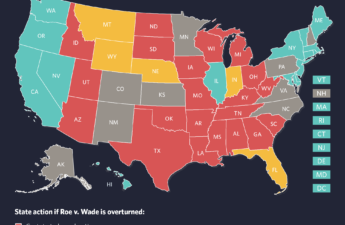Category: Contraception
The number of births continues to fall, despite abortion bans
Births continued a historic slide in all but two states last year, making it clear that a brief post-pandemic uptick in the nation’s birth numbers was all about planned pregnancies that had been delayed temporarily by COVID-19.
Social media will tell you birth control causes mental health issues, weight gain and infertility – here are the facts
In recent years, there’s been a rise in misinformation about hormonal contraceptives on social media. Some women are reportedly even stopping their birth control as a result of misleading posts they’ve seen on TikTok and Instagram.
Opill, the first over-the-counter birth control pill, will be on shelves soon − here are some key things to know
Within weeks, for the first time in the U.S. consumers will be able to find a birth control pill on retail shelves.
FDA approves first daily over-the-counter birth control pill, Opill – a pharmacist and public health expert explain this new era in contraception
The FDA’s approval of the first-ever over-the-counter daily birth control pill means that people could soon get them from the same aisles as aspirin, eye drops or condoms.
Emergency contraception is often confused with abortion pills – here’s how Plan B and other generic versions work to prevent pregnancy
There are two types of emergency contraception pills. The most widely known is levonorgestrel, which is sold in the U.S. under the brand name Plan B, along with numerous generic versions. The second type of emergency contraception pill is ulipristal acetate, which is sold under the brand name ella. Both Plan B and ella work by delaying ovulation
Breast cancer: progestogen-only and combined birth control both increase risk – here’s what you need to know
Until now, it was thought that only the combined hormonal pill carried a greater risk of breast cancer. But a recent study suggests that the progestogen-only pill (also known as the mini pill) and other forms of hormonal contraception also carry the same increase in breast cancer risk as the combined pill.
Sexual and reproductive telehealth services now available in Washington state.
Available telehealth services include birth control refills, pregnancy options counseling, emergency contraceptives, and screenings for sexually transmitted infections.
Post-‘Roe,’ Contraceptive Failures Carry Bigger Stakes
The failure rate for typical use of birth control pills is 7%. For every million women taking pills, 70,000 unplanned pregnancies could occur in a year. According to the most recent data available, more than 6.5 million women ages 15 to 49 use oral contraceptives, leading to about 460,000 unplanned pregnancies. Even seemingly minuscule failure rates of IUDs and birth control implants can lead to surprises.Even seemingly minuscule failure rates of IUDs and birth control implants can lead to surprises. Some 4.8 million women use IUDs or implants in the U.S., leading to as many as 5,000 to 20,000 unplanned pregnancies a year.
When abortion at a clinic is not available, 1 in 3 pregnant people say they will do something on their own to end the pregnancy
Overall, 34% of pregnant women surveyed would definitely or probably consider doing something on their own to end their pregnancy if they couldn’t get an abortion in a clinic.
How primary care is poised to support reproductive health and abortion in the post-Roe era, UW doctors say
Emily M. Godfrey, University of Washington and Adelaide H. McClintock, University of Washington Just over a month after the Supreme Court struck down 50 years of federal protection of abortion rights in the U.S., at least 43 abortion clinics in…
A growing number of women give birth at Catholic hospitals, where they do not receive the same reproductive health options – including birth control – provided at other hospitals
Given the health risks of having a rapid repeat pregnancy, avoiding pregnancy is especially critical for those who have recently given birth. But not all health care providers offer birth control to their patients.
Birth Control Limits to Follow Abortion Bans?
Many advocates on reproductive health issues think U.S. Supreme Court Justice Samuel Alito’s draft opinion overturning Roe v. Wade will further fuel some conservatives’ efforts to limit access to birth control. Although Alito specifically said in the draft that the ruling would not pertain to other rights courts also grounded in privacy, activists worry opponents will marshal his argument on privacy to attack birth control or gay marriage, for example.
Blue States Enact New Laws to Create Abortion Havens
In March, Washington Democratic Gov. Jay Inslee signed a bill prohibiting the state from taking legal action against people seeking an abortion and those who assist them, to ward off any attempts to enact a Texas-style abortion ban that calls on private citizens to sue anyone suspected of aiding an abortion.
Doctors Trying to Prescribe Abortion Pills Across State Lines Stymied by Legislation
Many states already restrict doctors’ ability to consult with patients online or by phone and/or dispense abortion pills through mail-order pharmacies. A crop of new legislation could shut them out, pushed by lawmakers who oppose abortion and argue the medication is too risky to be prescribed without a thorough, in-person examination.
High Court Allows Employers To Opt Out Of ACA’s Mandate On Birth Control Coverage
In a 7-2 ruling in a case involving the Little Sisters of the Poor, the court said employers with a “religious or moral objection” to contraceptives should not be forced to insure women for those services.













